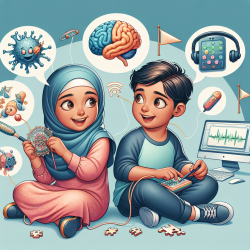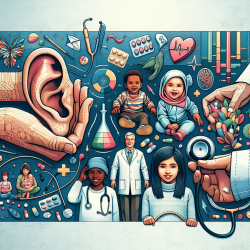Autism Spectrum Disorder (ASD) diagnosis in Brazil faces several challenges, as highlighted in the research article "Challenges on Diagnoses and Assessments Related to Autism Spectrum Disorder in Brazil: A Systematic Review." Understanding these challenges can help practitioners improve their diagnostic skills and outcomes for children with ASD.
Key Findings
The systematic review identified critical barriers to ASD diagnosis in Brazil, including:
- Late diagnosis, with an average delay of 3 years between parents' suspicion and formal diagnosis.
- Lack of trained health professionals to recognize ASD symptoms.
- Limited availability and use of diagnostic tools translated into Portuguese.
- Geographical disparities in access to healthcare, with most specialists concentrated in wealthier regions.
Recommendations for Practitioners
Based on the findings, practitioners can take several steps to improve ASD diagnosis:
- Invest in Training: Health professionals should seek training programs to enhance their knowledge and skills in diagnosing ASD. The study by Bordini et al. (2014) showed that trained providers significantly improved their ASD knowledge and increased referrals to specialized services.
- Utilize Validated Tools: Employ validated screening and diagnostic tools such as the Autism Diagnostic Interview-Revised (ADI-R) and the Childhood Autism Rating Scale (CARS), which have been translated into Portuguese.
- Promote Early Screening: Incorporate routine screening for ASD during pediatric visits. Early identification can lead to timely intervention, improving long-term outcomes for children.
- Enhance Communication: Foster positive interactions with parents and caregivers. Address their concerns seriously to build trust and encourage them to report developmental issues early.
Encouraging Further Research
Practitioners are encouraged to engage in and support further research to address the gaps identified in the systematic review. Areas needing more research include:
- Development and validation of new diagnostic tools specific to the Brazilian context.
- Studies on the effectiveness of training programs for healthcare providers in rural and underserved areas.
- Research on the socio-economic factors affecting access to ASD diagnosis and treatment.
By addressing these challenges and implementing the recommendations, practitioners can significantly improve the diagnostic process and outcomes for children with ASD in Brazil.
To read the original research paper, please follow this link: Challenges on Diagnoses and Assessments Related to Autism Spectrum Disorder in Brazil: A Systematic Review.










